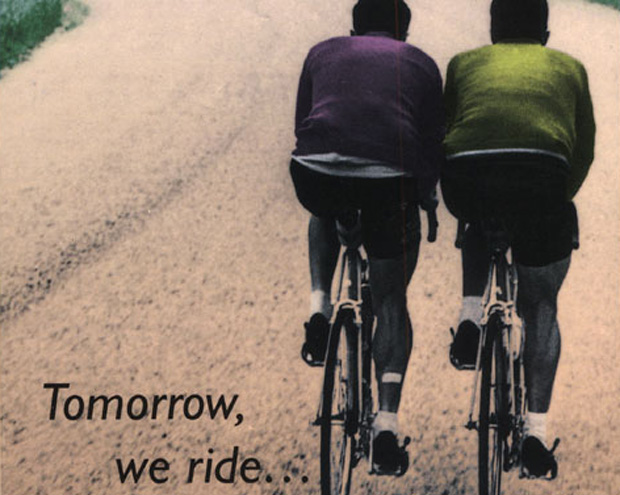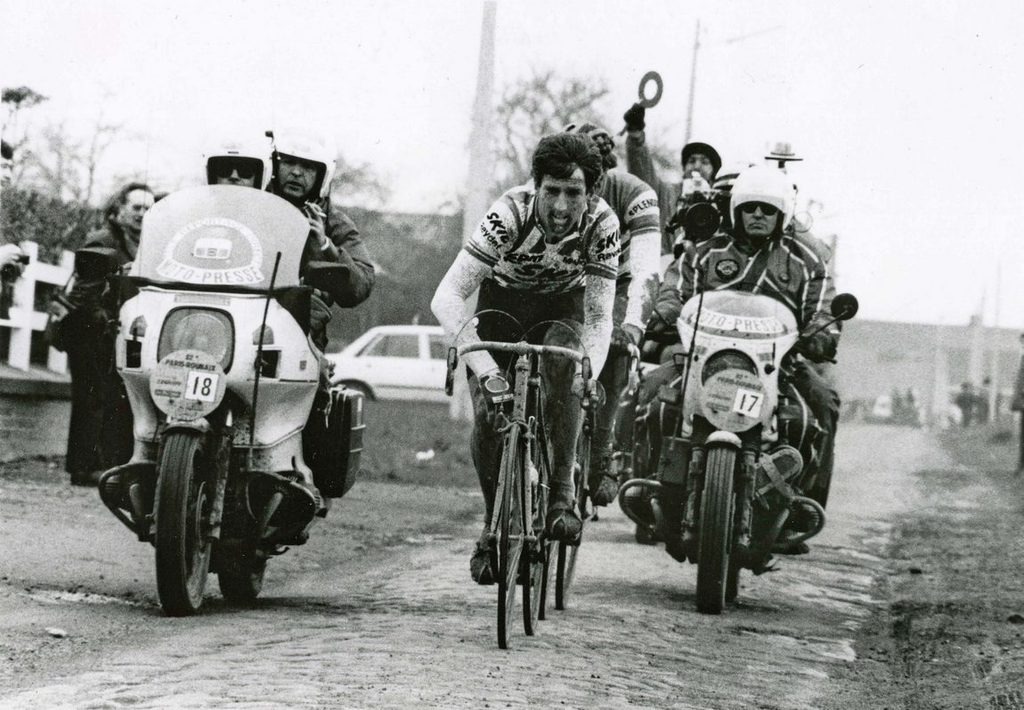La Volupte: I Was Flying Today

About a year and a half ago, as I was just starting to get really serious about cycling again after dabbling for about a decade, Michelle bought me every past issue of Rouleur and got me a two-year subscription. This is not a bike magazine. This is a quarterly publication for cyclists. It is printed on thick, heavy paper, and each issue is rife with pieces written by pros talking about a particular race, or mechanics putting in a 10 or 15 page piece on why they love tubs, how they select them or age them for a race, and how to glue one onto a rim properly. This isn’t fluffy stuff about Astana’s soap opera politics or What’s Hot and What’s Not; these are pieces you read over and over again: a long account by Robert Millar about the stage to L’Alpe d’Huez when he took the Polkadot Jersey in the 1984 Tour. Chris Boardman’s discussion on his Athlete’s Hour Record attempt, focusing on his collaboration with Royce and the effort that went into building the wheels for his ride.
Each issue starts with a two-page spread of an epic scene from road racing folklore on the left page, and on the right a well-chosen quote referring to the scene. The first issue I opened had a photo Eddy Merckx, complete with grimace on his face, accompanied by the quote, “On some days I would sit on my bike, weeping from the pain.” The next was of Bernard Hinault, growling at an empty road, paired with, “As long as I breathe, I attack.” Seattle is filled with short, steep climbs similar to the Ardenne with gradients of up to 25% and up to 4km in length; one of the hardest things for me as I clawed my way back into cycling form was the pain of hauling my fat ass over our route and its 1.5km vertical. These spreads reminded me to shut up and ride. In cycling, suffering is glory.
If the life of a cyclist is about suffering, why do we do it? Well, the fact is that on rare occasion, you don’t suffer. I’m not talking about those days when you top up on amphetamines or EPO; I’m talking about those days when you find the rhythm and when you find that place in your head where pain doesn’t tread. Many have sensed it, some have claimed to have felt it but haven’t, and fewer still have actually found it. The French call this La Volupte.
I recently read Jean Bobet’s book, Tomorrow, We Ride. This isn’t a biography of his older brother, Louison, but instead is a book about his life as a cyclist. Obviously, that life is deeply intertwined with Louison’s career, but none-the-less, this book is about a passion for cycling that goes beyond careers and racing results. In some places it is historical, in others touching, and yet in others is downright funny. But mostly, it’s about a love for a cycling life. Jean recounts two cases where he found La Volupte. The first was a training ride with Louison around Lake Como before the Giro di Lombardia. You can almost smell the thick, misty air by the lake as he describes their ride and the perfection of that moment on the bike. The second was on a lone training ride on the Cote d’Azur where he floated up one of the climbs on his route in perfect harmony with his machine and the gradient. La Volupte is fleeting, and the spell is usually broken by some external interference, as was the case for both of Jean’s accounts. On Lake Como, it was broken by the horn of a passing vehicle – on the Azur, by taking a sip of water from his bidon at the top of the climb. In an instant, La Volupte is gone and what remains with us is an unquenchable thirst to find it again.
La Volupte translates roughly to “voluptuousness”, and while the first thing the mind goes to is a sexual definition, my favorite is, “the property of being lush and abundant and a pleasure to the senses”. In a sport where pain is worn like a badge of honor, those times when cycling is lush and abundant and a pleasure to the senses are what makes us want to climb onto our bikes again tomorrow. When Bobet returned home from his ride on the Azur, his brother asked him how it went. His answer was simply, “I was flying today.”


Nice words Frank, you’ve captured the capturing of the essence of suffering by those who have suffered in ways we mere mortals will never get close to.
@brett
Thanks, man. If you get the chance, check out the book and the publication – it is worth every penny. Changed my life as a cyclist.
I’ll have to check out the book too. I just picked up A Dog in A Hat which in some ways sounds similar. So far it’s been a fun read. Great post btw man.
@Marko
Thanks, dude. I have had my eye on that book as well, you’ll have to let me know how it is. I also really enjoyed Breaking the Chain, although that is less about the cycling life than the doping life. Seems those two get confused a lot these days.
The “I was flying today” line reminds me of what Roald Amundson said upon being the first person to reach the north pole. It was in deep contrast to what Scott said in trying to reach it. Scott said something to the affect of “this place is a frozen wasteland uninhabitable for humans”. Amundson, upon arrival, simply said “Today was a good day for skiing.”
@Marko
That is awesome. I had never read that, but you can really get how different their mindset was. Morale is so important, that’s also something I admire a lot about Shackleton; how did he keep those guys from just giving up and dying?
I have some info on how Shackleton kept his group alive. There’s good news and bad news from a Velominatus’ perspective. I hope it won’t upset you. See below from The Independent (British newspaper that nobody reads):
Obviously it’s encouraging to see Shackleton had the right stuff in the bidon (beer of course would have frozen), but what the f***??? was he doing on “Royds”???
@George
Contrast
“Great God!, this is an awful place.” -Scott on the South Pole.
“Today it was a great day for skiing.” -Roald Amundsen on reaching the South Pole for the first time in history.
The bigger question is why did he leave it behind?
Aren’t ALL the coasts of Antarctica “northern”? and I would definitely like to get me a taste of that Scotch.
@frank
Wow, great post. I am slowly finding my way around these halls and each turn shows me something new and worthwhile. Guess I now know what to ask the wife to get me for Christmas!
Came tantalizingly close today! That, in itself, was quite a feeling””and why I ride…
I bought ‘Tomorrow, We ride’ a week ago. 6 days ago, I finished it, having been unable to it put down.
Bobet’s sparse, elegant style and truthfulness for me mirrors his hard work and pure dedication to his more talented brother, and in broader terms the simple but hard life of a professional cyclist in the ’50s.
The brief chapter on ‘La Volupte’ is only a few paragraphs long, but in this short space Bobet explained why I love cycling better than I’ve ever been able to!
One day, I’ll have a bike on with an inscription the top tube, “Demain, On roule…”
@Tom
A+1. It’s one of those haunting little books which takes only a brief moment to read but burrows deep into you and stays around much longer. I often think of it – more particularly the “I was flying today” quote – when I am out on one of those solo rides when there is just me, the rhythm, the road and a stoopid big grin on my face.
Beautiful book. Le Volupte captures those moments on a ride that stay with you hours, days, months later. Sometimes we hold back, but this chapter gives us permission let go and let the magic unfold.
@chiam
Very well put – agreed completely!
I do not even know how I ended up here, however I thought this put up used to be good.
I do not realize who you are but certainly you’re going
to a famous blogger when you aren’t already. Cheers!
La Volupte is a too rare Nirvana. There are moments of rides from 20 years ago that I still remember not because I was experiencing La Volupte but because I was suffering and wanted to crawl into a hole and die. Every turn of each pedal was a battle of will.
I didn’t know much about bike riding then but had a passion born of watching Le Tour De France in the 80s and early 90s.
Some of the best cycling memories come from moments of pain, some from being hopelessly lost in a foreign country (in this case France, where any stranger on a bike is made welcome), and some from the moments of human kindness when lost.
The bicycle is the greatest machine invented. Its simplicity familiar to all and the experience it gives available to most.
I’ve not been here for a while (not really sure why not as I always enjoy the articles), but I’ve just ridden home from work and averaged 20mph for the 24 miles to the bottom of the last steep hill. I’ve never ridden that fast for that long before – my previous best was 20miles in an hour, 31 years ago at university. So I looked up la volupte, and finished up here. I certainly had to muscle it a bit, but the bike and I have never felt quite so ‘as one’. Maybe it’s because I’ve now ridden it about as many miles as I paid pounds for it.
No special point, just wanted to share it!
@stratman
Thanx for that by the way. Always good to hear that someone is working against the clock, especially when trying to do it all in 1 hour — no data, just time. Depending on your terrain, that 20mph may be “extra” special.
goosebumps